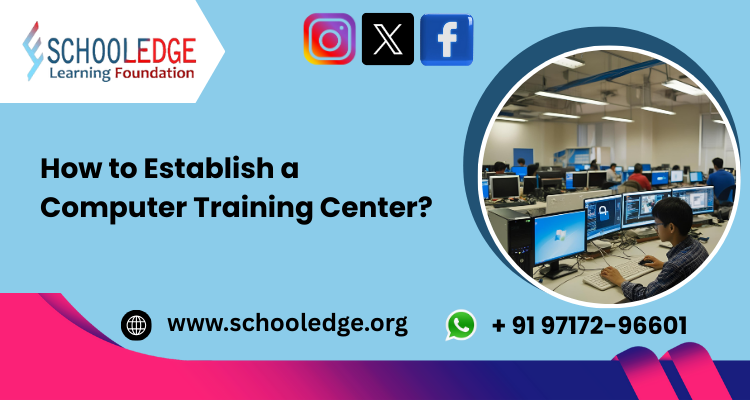
Apr 30-2025
How To Establish a Computer Training Center?
With technology growing fast, every industry in India is changing. This has created a high demand for computer specialists. Whether you're a student looking to build a strong career, a job seeker wanting better opportunities, or an entrepreneur ready to start something new, learning the right computer skills can open many doors.
Today, many computer courses in India are popular and profitable. These include courses in basic computer knowledge, programming, graphic design, digital marketing, web development, and more. These skills are needed in almost every job sector now.
If you are interested in education, starting your own computer training center is a smart idea. By becoming a franchise partner of a government-recognized computer institute, you can run your center with full support. This includes ready-made course materials, training, marketing help, and certificates that are respected all over India.
Choosing the best computer institute franchise in India gives you an edge over others. It builds trust with students and helps you grow faster because of the brand’s reputation. These franchises also guide you in setting up your center, training staff, and managing students.
In short, learning or teaching computer skills is a great step towards a better future. Whether you learn or start your own institute, now is the perfect time to be part of India's digital growth story.
1 Conduct Market Research
Objective: Understand your target area's demand, competition, and training needs.
- Identify your target audience: students, job seekers, professionals, entrepreneurs.
- Survey local demand: What skills are in demand? (e.g., MS Office, web development, graphic design, cybersecurity, coding for kids, etc.)
- Assess competitors: services, fees, reputation, curriculum.
- Check employment trends: Align your course offerings with job market needs.
2 Create a Business Plan
Essential components:
- Executive Summary: Vision, mission, objectives.
- Services Offered: List of courses (basic computer skills, advanced IT certifications, specialized workshops).
- Market Analysis: Findings from your research.
- Marketing Strategy: Advertising, social media presence, partnerships with schools/colleges.
- Financial Projections: Startup costs, operational expenses, revenue forecast.
- Management Structure: Roles, responsibilities, staffing plan.
3 Legal & Regulatory Compliance
Key actions:
- Register your business: Choose a legal structure (sole proprietorship, partnership, LLC, etc.)
- Get necessary licenses and permits: This may include a business license, vocational education license, and health and safety clearance.
- Comply with data protection laws, especially when handling student records digitally.
4 Infrastructure & Equipment Setup
Infrastructure essentials:
- Location: Accessible, safe, well-ventilated, with reliable utilities.
- Computers: Sufficient number, good specs (i5/i7, 8GB RAM minimum, SSD recommended).
- Networking: High-speed internet, routers, backup power.
- Furniture: Desks, ergonomic chairs, whiteboard/projector.
- Software: Licensed OS, office suites, antivirus, and course-specific tools.
- Backup & Security: Data backup systems and physical security measures.
5 Curriculum Development
Steps:
- Define course outlines: Based on popular certification bodies (Microsoft, Cisco, Google, CompTIA).
- Customize modules: Match local employment needs and student capability levels.
- Engage industry professionals: For syllabus input and guest lectures.
- Offer certification: Align with globally recognized certification programs when possible.
6 Hire Qualified Staff
Key roles:
- Instructors/trainers: Certified professionals with teaching experience.
- Administrative staff: Receptionist, accounts, maintenance.
- IT support: Onsite or on-call for technical troubleshooting.
7 Marketing & Outreach
Effective tactics:
- Website and social media pages
- Workshops and free demo classes
- Tie-ups with schools, colleges, and local businesses
- Flyers, radio ads, and posters in the community
8 Financial Planning & Management
Important aspects:
- Initial investment breakdown: Rent, equipment, licenses, marketing, staffing.
- Revenue model: Per-course fees, monthly packages, corporate training contracts.
- Operational costs monitoring: Utilities, maintenance, salaries, internet.
- Software for accounting: QuickBooks, Zoho Books, or a local equivalent.
9 Quality Control & Continuous Improvement
Actions:
- Regular feedback: From students and instructors.
- Periodic syllabus updates: To keep pace with technology.
- Instructor training: Encourage certification renewals and skill upgrades.
- Community engagement: Host events, competitions, and job fairs.

